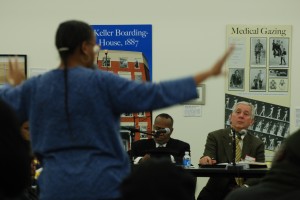 Bed bugs have returned, invading our hospitals, hotels, public transportation, and most unsettling of all, our homes. While bed bugs do not transmit disease, bed bugs have proven to be a serious nuisance to homeowners and renters alike, across the nation.
Bed bugs have returned, invading our hospitals, hotels, public transportation, and most unsettling of all, our homes. While bed bugs do not transmit disease, bed bugs have proven to be a serious nuisance to homeowners and renters alike, across the nation.
While New York City leads the nation in reported incidents of bed bug infestations, according to an August 2010 report released by Terminix, the Windy City does not find itself far behind – we live in the fifth most bed bug infested city in the U.S. MTO can certainly attest to this, as hotline calls pertaining to bed bugs have increased dramatically in the last two years. In 2010, MTO received 313, usually very frantic, calls with complaints of bed bugs. Two years ago, bed bug calls to MTO’s hotline were nonexistent.
In response to this sudden reemergence of bed bugs in Chicago, MTO has led efforts to create a roundtable of representatives from HUD, EPA, Chicago Department of Public Health, Illinois Department of Public Health, and other invested agencies and community organizations. MTO is actively working with this group on creating a policy proposal for HUD subsidized buildings. Among other recommendations, MTO has proposed the following to be included in a HUD policy on bed bugs:
-Landlords should disclose any known bed bug infestations within the previous 12 months to prospective renters,
-HUD should support an initiative for an educational campaign on bed bugs and pest control,
-Landlords should hire certified/licensed pest control professionals for both bed bug inspections and treatments,
-Landlords should encourage tenant notification of bed bug sightings by never retaliating against tenants (e.g. imposing fees, threatening eviction, etc),
-and HUD should allocate a long term source of funding to help landlords and renters combat bed bug infestations.
MTO is working on the bed bug issue at the state level as well. Meron Kahssai, an MTO Healthy Homes Organizer, has been appointed to the Illinois Subcommittee on Bed Bugs, a subcommittee of the Illinois Structural Pest Control Advisory Council. MTO will serve on this subcommittee as the voice of renters and will provide the necessary insight on the plight of renters to the other members of the state’s bed bug subcommittee. The goal of this subcommittee is to create a report with recommendations to the IL General Assembly on the prevention, management, and control of bed bugs which include recommendations on an educational campaign, proper transport and disposal of bed bug infested materials, and best practices of treatment and eradication.
Tenants who have dealt with bed bugs are encouraged to join MTO’s bed bug committee. This committee is open to anyone who is interested in serving the need of renters affected by bed bugs by pushing policies for both subsidized and market rate renters. Please contact Meron Kahssai at 773-292-4980 ext. 229, if interested.
Bed bugs will be the topic of discussion at the January 20th Tenant Congress meeting at the Chicago Urban League (4510 S. Michigan). Following a presentation on bed bugs, the floor will be open for a question and answer session. This meeting is open to the public.
 Wednesday, June 30th will be your chance to voice your concerns to Mr. Ed Hinsberger, Chicago Multifamily HUD Director, and Mr. George Gilmore, HUD Neighborhood Coordinator.
Wednesday, June 30th will be your chance to voice your concerns to Mr. Ed Hinsberger, Chicago Multifamily HUD Director, and Mr. George Gilmore, HUD Neighborhood Coordinator.